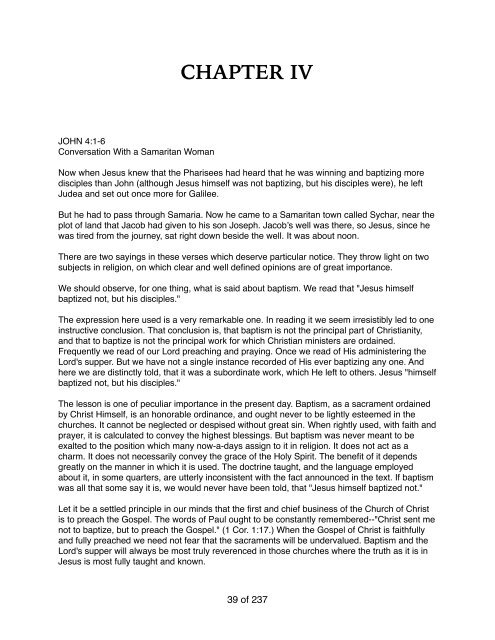J. C. Ryle John
John Charles Ryle (May 10, 1816 - June 10, 1900) was an evangelical Anglican clergyman and first Bishop of Liverpool. He was renowned for his powerful preaching and extensive tracts.
John Charles Ryle (May 10, 1816 - June 10, 1900) was an evangelical Anglican clergyman and first Bishop of Liverpool. He was renowned for his powerful preaching and extensive tracts.
You also want an ePaper? Increase the reach of your titles
YUMPU automatically turns print PDFs into web optimized ePapers that Google loves.
CHAPTER IV<br />
JOHN 4:1-6<br />
Conversation With a Samaritan Woman<br />
Now when Jesus knew that the Pharisees had heard that he was winning and baptizing more<br />
disciples than <strong>John</strong> (although Jesus himself was not baptizing, but his disciples were), he left<br />
Judea and set out once more for Galilee.<br />
But he had to pass through Samaria. Now he came to a Samaritan town called Sychar, near the<br />
plot of land that Jacob had given to his son Joseph. Jacob’s well was there, so Jesus, since he<br />
was tired from the journey, sat right down beside the well. It was about noon.<br />
There are two sayings in these verses which deserve particular notice. They throw light on two<br />
subjects in religion, on which clear and well defined opinions are of great importance.<br />
We should observe, for one thing, what is said about baptism. We read that "Jesus himself<br />
baptized not, but his disciples."<br />
The expression here used is a very remarkable one. In reading it we seem irresistibly led to one<br />
instructive conclusion. That conclusion is, that baptism is not the principal part of Christianity,<br />
and that to baptize is not the principal work for which Christian ministers are ordained.<br />
Frequently we read of our Lord preaching and praying. Once we read of His administering the<br />
Lord's supper. But we have not a single instance recorded of His ever baptizing any one. And<br />
here we are distinctly told, that it was a subordinate work, which He left to others. Jesus "himself<br />
baptized not, but his disciples."<br />
The lesson is one of peculiar importance in the present day. Baptism, as a sacrament ordained<br />
by Christ Himself, is an honorable ordinance, and ought never to be lightly esteemed in the<br />
churches. It cannot be neglected or despised without great sin. When rightly used, with faith and<br />
prayer, it is calculated to convey the highest blessings. But baptism was never meant to be<br />
exalted to the position which many now-a-days assign to it in religion. It does not act as a<br />
charm. It does not necessarily convey the grace of the Holy Spirit. The benefit of it depends<br />
greatly on the manner in which it is used. The doctrine taught, and the language employed<br />
about it, in some quarters, are utterly inconsistent with the fact announced in the text. If baptism<br />
was all that some say it is, we would never have been told, that "Jesus himself baptized not."<br />
Let it be a settled principle in our minds that the first and chief business of the Church of Christ<br />
is to preach the Gospel. The words of Paul ought to be constantly remembered--"Christ sent me<br />
not to baptize, but to preach the Gospel." (1 Cor. 1:17.) When the Gospel of Christ is faithfully<br />
and fully preached we need not fear that the sacraments will be undervalued. Baptism and the<br />
Lord's supper will always be most truly reverenced in those churches where the truth as it is in<br />
Jesus is most fully taught and known.<br />
39 of 237




